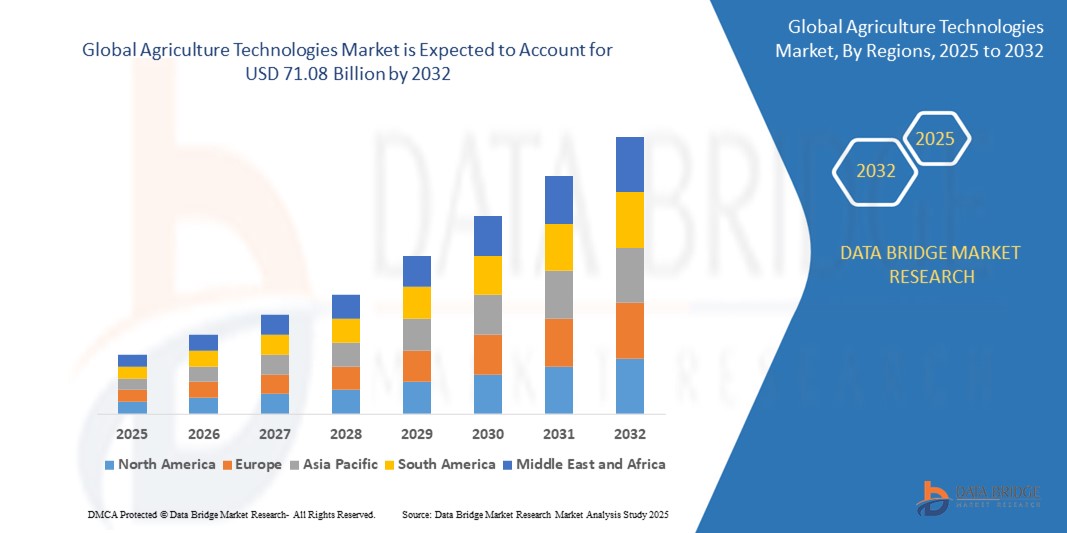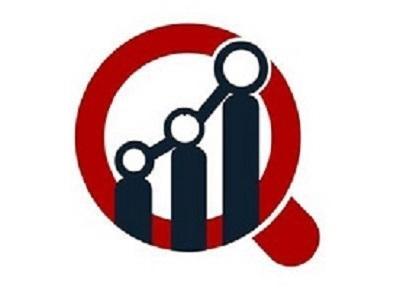Agriculture Technologies Market Insights | Anticipating Growth and Advancements by 2032
The global agriculture technologies market size was valued at USD 26.30 billion in 2024 and is expected to reach USD 71.08 billion by 2032, at a CAGR of 13.23% during the forecast period
Introduction
The agriculture technologies market has experienced remarkable growth over the past decade as farmers, agribusinesses, and governments seek innovative solutions to enhance productivity, optimize resource utilization, and ensure sustainability. Agriculture technologies, commonly referred to as agritech, encompass a wide range of solutions, including precision farming, automation, artificial intelligence (AI), Internet of Things (IoT) applications, biotechnology, and farm management software. These technologies are transforming traditional farming practices by enabling data-driven decision-making, reducing operational costs, and increasing crop yields.
The rising global population and changing dietary habits are putting pressure on food systems, creating an urgent need for efficient agricultural production. Simultaneously, environmental concerns such as soil degradation, water scarcity, and climate change necessitate the adoption of sustainable farming practices. Agriculture technologies are playing a pivotal role in addressing these challenges while supporting the modernization of farms across the globe.
Market Overview
Agriculture technologies can be classified into several categories, each offering unique advantages for modern farming. Precision agriculture involves the use of sensors, GPS systems, drones, and satellite imagery to monitor soil health, crop growth, and weather conditions. This approach enables farmers to optimize the use of fertilizers, pesticides, and water resources, improving yields while minimizing environmental impact.
Automation in agriculture, including autonomous tractors, robotic harvesters, and smart irrigation systems, reduces reliance on manual labor and increases operational efficiency. AI and machine learning algorithms provide predictive insights for pest and disease management, weather forecasting, and crop health monitoring, allowing farmers to take proactive measures.
Biotechnology, including genetic engineering and crop breeding, supports the development of high-yield and disease-resistant crops, ensuring food security in the face of changing climate conditions. Digital platforms and farm management software streamline farm operations by collecting, analyzing, and visualizing data to facilitate informed decision-making.
Market Drivers
Rising food demand and global population growth
The increasing global population has intensified the need for higher agricultural productivity. Agriculture technologies enable farmers to produce more food per unit of land, enhancing efficiency while reducing the environmental footprint of agricultural operations.
Precision farming and resource optimization
Precision agriculture allows for targeted application of fertilizers, pesticides, and water, reducing wastage and improving crop performance. This not only lowers production costs but also supports sustainable farming practices by minimizing soil and water contamination.
Automation and labor efficiency
Labor shortages in the agricultural sector have driven the adoption of automation technologies. Robotic equipment and autonomous machinery reduce dependency on human labor, enhance productivity, and enable timely completion of farming activities.
Technological advancements in AI and IoT
The integration of AI and IoT in agriculture allows for real-time monitoring of crops, livestock, and environmental conditions. AI-driven analytics provide insights into yield prediction, disease detection, and irrigation management, while IoT sensors collect critical data to support decision-making.
Sustainability and environmental concerns
Increasing awareness of environmental sustainability is prompting farmers to adopt technologies that conserve resources and reduce the ecological impact of agriculture. Practices such as precision irrigation, controlled nutrient application, and climate-smart crop management are gaining traction globally.
Market Challenges
High initial investment and cost barriers
The implementation of advanced agriculture technologies requires significant capital investment, which can be prohibitive for smallholder farmers and emerging economies. This limits adoption despite the potential benefits.
Technical complexity and lack of expertise
Many agritech solutions involve complex hardware, software, and data analysis, requiring specialized knowledge. Farmers may face challenges in integrating and managing these technologies without adequate training and support.
Data privacy and cybersecurity concerns
The use of digital platforms and IoT devices in agriculture generates large volumes of data, raising concerns regarding data security, privacy, and potential misuse by third parties.
Regulatory and policy constraints
Inconsistent regulations, licensing requirements, and varying approval processes for technologies such as genetically modified crops and drones can slow down market growth. Compliance with local and international regulations remains a challenge for manufacturers and service providers.
Opportunities in the Market
Smart farming and IoT expansion
The growth of smart farming solutions, including IoT-based monitoring, drone surveillance, and automated irrigation, offers significant opportunities. These technologies allow farmers to achieve higher efficiency, lower costs, and improved yields.
Biotechnology and genetically engineered crops
Innovations in biotechnology, such as drought-resistant, pest-resistant, and nutrient-enriched crops, present opportunities for agritech companies to address food security challenges while catering to environmentally conscious consumers.
Digital platforms and data analytics services
Farm management software, AI-based analytics, and cloud-based platforms offer opportunities for providing actionable insights to farmers. Subscription-based services and data-driven advisory solutions are gaining traction in both developed and emerging markets.
Emerging regions and market penetration
Asia-Pacific, Latin America, and Africa present immense growth potential due to increasing adoption of modern farming practices, government initiatives, and rising awareness about technology-driven agriculture solutions.
Industry Segmentation
By Technology
-
Precision Agriculture (drones, sensors, GPS)
-
Automation and Robotics (autonomous tractors, robotic harvesters)
-
Artificial Intelligence and Machine Learning (predictive analytics, disease detection)
-
Biotechnology (genetically modified crops, crop breeding)
-
Digital Platforms and Farm Management Software
By Application
-
Crop Production
-
Livestock Management
-
Greenhouse Farming
-
Aquaculture
-
Horticulture
By End User
-
Commercial Farms
-
Smallholder Farms
-
Cooperatives and Community Farming
-
Agricultural Research Institutions
-
Government and Public Sector
Regional Insights
North America
North America represents a mature agritech market, with the United States leading adoption due to strong infrastructure, access to technology, and focus on sustainability. Large-scale farms are investing heavily in automation, precision agriculture, and digital farming platforms.
Europe
Europe emphasizes sustainable farming and environmental conservation. Countries such as Germany, France, and the Netherlands are adopting advanced technologies, including precision irrigation, climate-resilient crops, and AI-based farm management systems.
Asia-Pacific
Asia-Pacific is emerging as a key market for agriculture technologies due to rising populations, urbanization, and government initiatives supporting smart farming. India, China, and Southeast Asian countries are investing in precision agriculture, IoT applications, and digital platforms.
Middle East & Africa
The Middle East and Africa are adopting water-efficient technologies, climate-resilient crops, and smart irrigation systems to address challenges such as water scarcity and arable land limitations.
Latin America
Countries such as Brazil and Argentina are increasingly implementing precision agriculture, drone monitoring, and advanced crop management techniques to improve productivity and sustainability.
Competitive Landscape
The agriculture technologies market is highly competitive, featuring global technology providers, agritech startups, and regional solution providers. Key strategies include partnerships with farmers, investment in research and development, and introduction of innovative solutions tailored to local farming conditions.
Major players in the market include Deere & Company, Trimble Inc., AG Leader Technology, AGCO Corporation, The Climate Corporation, Syngenta, Bayer CropScience, CNH Industrial, DroneDeploy, and Indigo Agriculture. These companies focus on expanding product portfolios, enhancing digital platforms, and integrating AI and IoT technologies to gain a competitive edge.
Future Outlook
The agriculture technologies market is expected to grow steadily as farmers increasingly adopt precision agriculture, automation, and AI-based solutions to enhance productivity and sustainability. Digital platforms and IoT integration will continue to transform farming practices by enabling data-driven decisions, predictive maintenance, and real-time monitoring.
Biotechnology innovations, including genetically modified crops and disease-resistant plant varieties, will further strengthen global food security. Additionally, the expansion of smart farming, coupled with growing environmental awareness, will drive the adoption of sustainable practices and water-efficient solutions across the agricultural sector.
As agritech continues to evolve, manufacturers and service providers focusing on cost-effective, scalable, and user-friendly solutions will capture significant market opportunities. Governments and research institutions supporting digital agriculture initiatives will further accelerate growth and technology penetration, particularly in emerging regions.
Conclusion
The agriculture technologies market is reshaping the way food is produced, managed, and distributed worldwide. From precision agriculture and automation to AI, IoT, and biotechnology, these technologies enable farmers to increase productivity, reduce costs, and implement sustainable practices. While challenges such as high initial investment, technical complexity, and regulatory constraints exist, the market presents substantial opportunities for innovation, regional expansion, and smart farming solutions. Continued investment in research, digital platforms, and environmentally friendly technologies will ensure the agriculture sector meets global food demand while addressing sustainability challenges.
FAQs
What are the primary technologies used in modern agriculture?
How does precision agriculture improve crop yields and resource efficiency?
What role does AI play in smart farming and livestock management?
Which regions are leading in the adoption of agriculture technologies?
What challenges do smallholder farmers face in adopting advanced agritech solutions?
Equip yourself with actionable insights and trends from our complete Agriculture Technologies Market analysis. Download now:https://www.databridgemarketresearch.com/reports/global-agriculture-technologies-market
Browse More Reports:
Global Bowel Polyps Treatment Market
Global Brain Tumor Diagnosis and Treatment Market
Global Brazzein Market
Global Breast Reconstruction Market
Global Brucellosis Market
Global Bubble Wrap Market
Global Bubonic Plague Market
Global Building-Integrated Photovoltaics Facade Market
Global Bullet Train/High-Speed Rail Market
Global Butyric Acid Market
Global Calcium Based Heat Stabilizers Market
Global Calcium Channel Blocker Market
Global Camouflage Coatings Market
Global Canine Atopic Dermatitis Market
Global Capecitabine Market
About Data Bridge Market Research:
An absolute way to forecast what the future holds is to comprehend the trend today!
Data Bridge Market Research set forth itself as an unconventional and neoteric market research and consulting firm with an unparalleled level of resilience and integrated approaches. We are determined to unearth the best market opportunities and foster efficient information for your business to thrive in the market. Data Bridge endeavors to provide appropriate solutions to the complex business challenges and initiates an effortless decision-making process. Data Bridge is an aftermath of sheer wisdom and experience which was formulated and framed in the year 2015 in Pune.
Contact Us:
Data Bridge Market Research
US: +1 614 591 3140
UK: +44 845 154 9652
APAC : +653 1251 975
Email:- corporatesales@databridgemarketresearch.com






